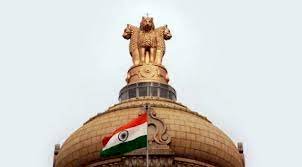Real test for government
For Printing Download Epaper from files section from bottom of this page

It may be state government in Maharashtra or central government, they have become habitual of avoiding opposition bombarding in a legislative or parliamentary session. So, both the governments are accustomed to contain the days of session and run from opposition questions. We have seen in Maharashtra recently that, even if most of the members are vaccinated and the severity of Corona second wave is lessened, the Mahavikas Aghadi government did not elongate the monsoon session of the assembly. Likewise, now parliament session for Modi government is going to start from 19th July. Congress and other opposition though have very less numbers in comparison to BJP, have an arsenal of subjects to corner Modi government in the parliament. There are number of issues on which the Modi government can be targeted like unrecorded Covid deaths, lack of distribution of Covid deterrent vaccines, mismanagement of vaccination program in the country, rising inflation and thousands of them. The session will be a real test for the Modi government as it has to face battery of questions from the opposition.The monsoon session of Parliament kicks off on July 19. This will be the first session after a majority of parliamentarians have been vaccinated, and will hopefully ease the convening of both Houses while complying with safety considerations. It will be the first session since Prime Minister Narendra Modi has expanded and reshuffled his council of ministers; the new faces in the executive will now begin their process of legislative accountability. It is the first session since the second wave of the Covid-19 pandemic devastated lives in the country in the summer. It is the first session since the Bharatiya Janata Party lost the West Bengal election, and a strong regional party, the Dravida Munnetra Kazhagam, returned to power in Tamil Nadu. And it is happening at a time when Opposition parties have mounted renewed efforts at unity, and the political climate has heated up in the run-up to the Uttar Pradesh assembly elections next year. So, this session will be a real testimony of how Modi government responds the challenged thrown by opposition and how the opposition is also united in attacking the government. All of this will have an impact on the nature of the session. While the government will be keen to push through its legislative agenda, the Opposition will be keen to corner the government on national security (particularly the border standoff with China), public health (particularly Covid-19 management and vaccination), state of democracy (particularly the road map in Jammu and Kashmir and new media rules), and economy and price rise (particularly of fuel). The polarised political climate will be a challenge, and both sides will be keen to advance their respective agendas. But it is crucial that the government gives space to the other side, consults the Opposition including on bills, and answers difficult questions transparently. It is as crucial that the Opposition acknowledges that the legislative majority allows the government to advance its objective, and provides constructive inputs while holding it accountable. A robust and functional session is important for Indian democracy. We have seen so far that, parliamentary sessions have been just a waste of public money and in the full session very less work is done. At least this time the pandemonium will not be seen and serious work of taking forward the bills which are very important may be taken up. For this to happen, both sides should show maturity and if it happens, we can say that the country has achieved a high level of maturity. The main question is whether both sides will show such maturity and political will to smoothly conduct the session.

 Active Times
Active Times 

















